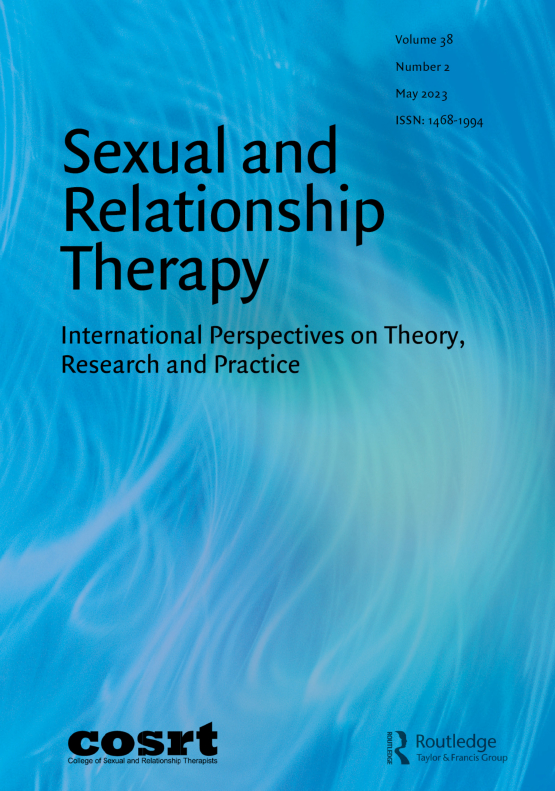Submit a Manuscript to the Journal
Sexual and Relationship Therapy
For a Special Issue on
Contemporary Queer Youth
Abstract deadline
31 July 2024
Manuscript deadline
30 November 2024

Special Issue Editor(s)
Allen Mallory, PhD,
Assistant Professor, The Ohio State University
[email protected]
Contemporary Queer Youth
Across the world we are increasingly seeing contemporary young generations identifying as queer in some way in greater numbers than older generations. “Queer” here is meant to be inclusive of the wider diversity and overlap of gender, sexual, erotic, and relational diversity. “Contemporary” is restricted to people 27 or younger, which roughly corresponds to the oldest youth in Gen Z and includes those in Gen Alpha. Research has been slow to keep up with the growing diversity in how queer youth understand and express themselves within the GSERD matrix and in relation to their intersections, identities, and experiences. This impoverished understanding of contemporary queer youth has critical implications for accurately representing not only their lives, but also informing clinical practice and research. Contemporary queer youths’ embodiment of GSERD has the potential to transform our understanding of their diverse experiences, paving the way for novel knowledge that can better equip researchers and practitioners to support the increasingly visible generations of young queer people.
This special issue looks to bring together those currently writing on, doing clinical work with, and conducting research into queer youth gender, sexuality, eroticism, and relational diversity in an applied research or therapeutic context. Examples of appropriate topics include, but are not limited to the following:
- Overviews of the literature on contemporary queer youth
- Representative pieces related to Couple and Family Therapy/Systemic Family Therapy/Psychosexual and Relationship Therapy approaches to -working with queer youth (e.g.. case studies)
- Relational diversity among contemporary queer youth (e.g., consensual non-monogamy, BDSM, monogamy, asexuality, long distance relationships, online relationships, and queer platonic relationships)
- Peer networks of contemporary queer youth
- A focus on marginalized contemporary queer youth’s voices (e.g., immigrants, racial/ethnic numerical minorities, those in war zones, those that are intersex or that have differences in sex development, neurodivergent youth, differently abled youth, unhoused or homeless youth, youth in foster care, impoverished youth).
- Substance use and mental health among contemporary queer youth
- The impact of COVID-19 on contemporary queer youth’s lives
- How contemporary queer youth navigate developing multiple identities (e.g., race, ability, religion, and socioeconomic status)
- Understanding and practice of GSERD among intersectional and marginalized identities or from non-dominant societal populations of queer youth
- Queer specific concerns of contemporary queer youth (e.g., binding, school policies about queer youth, gender affirming care, dating in the queer community)
- Contemporary queer youth’s use of technology, the internet and social media in their identity development
- Contemporary queer youth’s experiences being raised in diverse family structures (e.g., step-parent families, blended families, multigenerational families, multi-racial/ethnic households, polyamorous families, foster families, and families with queer parents)
- Contemporary queer youth’s experiences with family, whether chosen, family of origin, or raising their own children
Looking to Publish your Research?
Find out how to publish your research open access with Taylor & Francis Group.
Choose open accessSubmission Instructions
This special issue looks to bring together those currently writing on, doing clinical work with, and conducting research into queer youth gender, sexuality, eroticism, and relational diversity in an applied research or therapeutic context. Guest Editor of this Special Issue on Contemporary Queer Youth, Dr. Allen Mallory, invites empirical or review papers, commentaries, clinical case reports, theoretical pieces, and opinion pieces on the subject of contemporary queer youth (maximum 6000 words). Commentaries and opinion pieces will only be reviewed by the Guest Editor, while papers will also be sent for external peer review. The deadline for abstract submissions is July 31, 2024 and the abstract is to be no longer than 200 words and no less than 150 words. The expected publication date for this special issue is February of 2025--in the first issue of the new year. Informal enquiries and abstract submissions should be directed to: Dr. Allen Mallory ([email protected]).